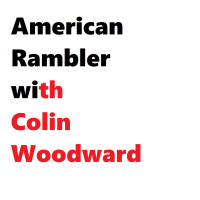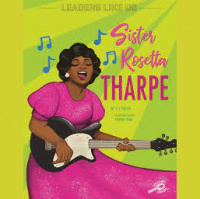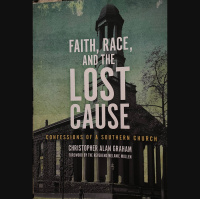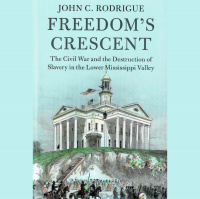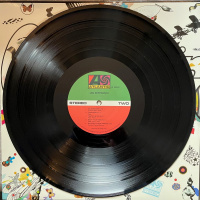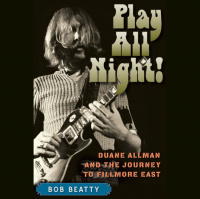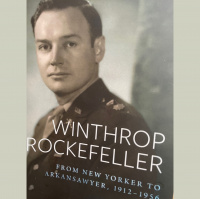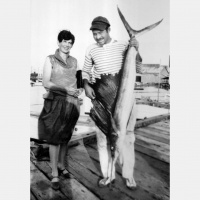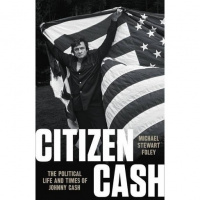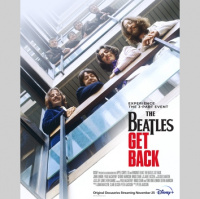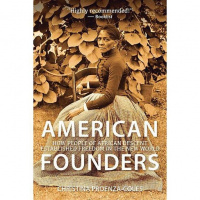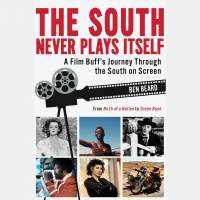American Rambler With Colin Woodward
- Autor: Vários
- Narrador: Vários
- Editor: Podcast
- Duración: 260:41:19
- Mas informaciones
Informações:
Sinopsis
Based in Richmond, Virginia, American Rambler discusses history, music, film, politics, and pop culture. The show is hosted by Colin Woodward, a historian, writer, and archivist. He is the author of Marching Masters: Slavery, Race, and the Confederate Army during the Civil War. He is revising a book on Johnny Cash.
Episodios
-
A Message from American Rambler
26/12/2023 Duración: 16minAfter eight years and more than 200 episodes, American Rambler is wrapping things up. This might not be the end of Colin's podcasting career, but this podcast is ending. Colin wants to thank everyone who has listened over the years and the guests who have appeared on the show. He also gives shout-outs to podcasts he currently enjoys if you want some recommendations. Thanks for your support, and good luck in 2024. We're gonna need it!
-
Season 8, Episode 10: Billy Don Burns Talks His New Album, "I've Seen a Lot of Highway"
05/10/2023 Duración: 28minBilly Don Burns is an Outlaw Country legend. Born and raised in Arkansas, he has crisscrossed the country repeatedly over the years. He just got back from Ireland, and he has a new album out, I've Seen a Lot of Highway, which chronicles decades of heavy touring and drugging, drinking, and "kicking ass." A survivor of bad bar fights, an 18 month prison stretch, and six marriages, he turned 74 this year. Has he changed from the hellraiser he once was? You decide. Along the way, Billy Don talks about working with Shooter Jennings and the late Mack Vickery as well as encounters with Waylon Jennings and Jerry Lee Lewis. You can buy the album here: https://found.ee/bdbhighway To check out tour dates, BDB merch, and other music: https://www.billydonburns.net/
-
Season 8, Episode 9: "Kingfish U: Huey Long and LSU" with Robert Mann
04/09/2023 Duración: 01h33minRobert Mann returns to the podcast to talk about his latest book, Kingfish U: Huey Long and LSU. Long--known as "The Kingfish" after a character from the popular radio show Amos 'n' Andy--was the governor of Louisiana from 1928 to 1932 and then senator until his death in 1935 (a fact that did not stop him from effectively being governor while serving as senator). In the seven years in which he had a virtual dictatorship, he accomplished a lot, perhaps no more so than he did at LSU. Long brought LSU into the ranks of modern southern colleges. For better or worse, it was Huey Long that made LSU what it is now: a football powerhouse with good academic departments. He also added to the state's odd and colorful history with his antics. As he did with everything, Long bent the law to his will so long as a pet project benefited. During Long's tenure, LSU grew considerably. LSU has changed quite a bit from the 1930s. But in other ways, it has not. Bob and Colin talk about what Long did, how it created a distinct LSU
-
Season 8, Episode 8: Dewar MacLeod on the Who's Tommy
04/08/2023 Duración: 01h27minDewar MacLeod is a Californian by way of Canada. He teaches in New Jersey now, but he grew up in L.A. in the 60s and 70s. And it was a 1969 album--the Who's rock opera Tommy--that blew his mind. In his latest book, Tommy, Trauma, and Postwar Youth Culture, he looks at what Tommy meant for the 60s, composer Pete Townshend, and the legions of Who fans who continue to love it to this day. A double album that put the Who into the ranks of premier rock bands, Tommy is a story of a "deaf, dumb, and blind boy" who goes on a spiritual journey. Along the way, he meets unsavory characters such as Cousin Kevin, Uncle Ernie, and the Acid Queen before achieving enlightenment and starting his own religion full of rebellious followers. Tommy was not only a smash record, it became transcendent when the Who played it live. It also inspired a memorable, albeit over-the-top 1975 Ken Russell film and a Broadway and London musical. Pete Townshend has talked about the album often since it came out. But why did he not want to talk
-
Season 8, Episode 7: Author J. P. Miller
09/07/2023 Duración: 01h25minJ. P. Miller is an Atlanta-based writer of numerous books for young readers. As she tells Colin, she served in the military for many years before joining the forest service. Eventually, she decided she wanted to write fulltime. She hasn't regretted that decision. And she's been prolific, penning titles in the Leaders Like Us and Black Lives Matters series. Her latest book is about Juneteenth, and she has another one coming out soon on HBCUs. She and Colin talk about her path to writing, her discipline, and some hard lessons she's learned about publishing along the way. Order her book on Juneteenth! https://www.amazon.com/Juneteenth-Pogo-Books-Holiday-History/dp/B0BY17HFCG/ref=sr_1_3?crid=2BVULRJGAHOHD&keywords=juneteenth+j.+p.+miller&qid=1688928220&sprefix=juneteenth+j.+p.+miller%2Caps%2C89&sr=8-3
-
Season 7, Episode 6: Chris Graham and His Book, "Fath, Race, and the Lost Cause"
23/04/2023 Duración: 01h21minChris Graham returns to the podcast to talk about his new (and first) book, Faith, Race, and the Lost Cause: Confessions of a Southern Church. His book looks at the history of St. Paul's in Richmond. The church became famous for being where two prominent Confederates--Robert E. Lee and Jefferson Davis--worshipped during the Civil War. In the latter years of the 19th century, the church became a centerpiece of the Lost Cause in Richmond. Before the civil rights movement swept the South in the post-WWII era, St. Paul's was a conservative place that believed--as did most of the South--in paternalism and the wisdom of Jim Crow society. Even more progressive movements, like the Social Gospel of the 1920s, failed to make a dent in the church's racial attitudes. By the late-60s, though, Richmond's politics and racial demographics had changed significantly. St. Paul's finally began to break down barriers between the races, though the struggle continues to this day. Dr. Graham's book is a result of the church reckoni
-
Season 7, Episode 5: John Rodrigue and the Destruction of Slavery during the Civil War
24/03/2023 Duración: 01h16minJohn C. Rodrigue returns! John is a professor of history at Stonehill College in Massachusetts, where he has been since 2007. He was one of Colin's professors at LSU when they were both in Baton Rouge in the early 2000s. John's new book is Freedom's Crescent: The Civil War and the Destruction of Slavery in the Lower Mississippi Valley (Cambridge University Press). It's John's third book. Influenced by everything from Eugene Genovese to Timothy Snyder's book on Eastern Europe, Bloodlands, Freedom's Crescent looks at the process whereby the Union went from freeing (some) slaves via the Emancipation Proclamation to the eradication of slavery through the 13th Amendment. As John makes clear, it was a complicated and frustrating process. Building on work of Armstead Robinson, James Oakes, and Michael Vorenberg, John provides a detailed look at how Union commanders and politicians grappled with thorny military, political, and constitutional issues in the western theater of operations. Historians have written many bo
-
Season 7, Episode 4: Greg Wells of Records and Relics
15/02/2023 Duración: 01h12minGreg Wells is a hustler. The owner of Records and Relics in the Church Hill neighborhood of Richmond, he's been buying and selling vinyl for a long time. As he tells Colin, he sold sold records at antique stores, vinyl shows, and on Ebay before he decided to get his own place. Greg has been in Richmond for over 25 years, and he's seen the city change quite a bit. But he's always been devoted to vinyl. Now he's the owner of a thriving business in a neighborhood humming with coffee shops, bars, and restaurants. An in-store podcast, Greg walks Colin through the process of setting up a small business, dealing with Covid, and not becoming a "record store guy" cliche. So, stop by the shop! Records and Relics is open Friday-Sunday, 12-5. Used vinyl only, but Greg is open to buying and trades. You can follow the store here: https://www.facebook.com/recordsandrelicsrva https://www.instagram.com/recordsandrelicsrva/?hl=en
-
Season 7, Episode 3: David Vaught on Pitcher Gaylord Perry
25/01/2023 Duración: 01h35minA professor at Texas A & M since the late-90s, David Vaught is a longtime baseball fan. A native of the Bay Area, he visited ever-chilly Candlestick Park as a kid and remembered seeing Perry pitch. But while he has loved the Giants, Spitter: Baseball's Notorious Gaylord Perry, grew out of a previous book on baseball. San Francisco was just one of many teams Perry played for, including the Indians, Rangers, Yankees, Braves, Royals, and Mariners. As David shows in his terrific biography, Gaylord Perry wasn't just notorious for his use of the spitter, he was also a fierce competitor and often difficult. Perry was a terror to batters as well as the men in the field behind him, management, and owners. Much of his competitive fire was rooted in his hard upbringing in rural eastern North Carolina, where he was the son of tobacco sharecroppers. He was also the younger brother of Jim Perry, who excelled as a major league pitcher. What are we to make of Perry? Did he deserve to be in the Hall of Fame? A known chea
-
Season 7, Episode 2: Bob Beatty and the Allman Brothers Band
11/10/2022 Duración: 01h26minPlay All Night!: Duane Allman and the Journey to Fillmore East is Bob Beatty's most recent book. Bob, however, has been an Allman Brothers fan for a long time. Like the Allmans, Bob has Florida roots. He now lives and works in Tennessee, where he got his Ph.D. and is a history and museum consultant. Bob's fast-reading book looks at the breakout album for the Allmans. Released in 1971, Live at Fillmore East is one of the best live albums ever, and it brought the band to a mass audience. It features the classic Allmans lineup, with Duane Allman and Dickey Betts on guitar, Gregg Allman on vocals and organ, Berry Oakley on bass, and Butch Trucks and Jaimoe Johanson on drums. Unfortunately, though Duane started the Allman Brothers Band, his time with the group was relatively brief. He died in a motorcycle accident only a few months after At Fillmore East came out. Duane was just 24, and there seemed no limit to what he could do as a guitarist. As Bob makes clear, with Duane at the helm, the Allmans were closer to
-
Season 7, Episode 1: John A. Kirk
04/09/2022 Duración: 01h18minJohn Kirk is English, but he has lived in Arkansas for more than ten years. Raised in the Manchester area, his fascination with the US began as a graduate student, where he studied the civil rights movement. He is the author and editor of ten books, and his newest is on soldier, philanthropist, and governor Winthrop Rockefeller (yes, that Rockefeller family). It is the first fullscale scholarly treatment of WR's early life. In Arkansas, the legacy of Winthrop Rockefeller is a palpable one. Elected in 1966, WR was the first Republican Arkansas governor since Reconstruction. The fact that it took 90 years for that to happen says a lot about the political culture in which he lived. His journey from New York City to Little Rock may seem odd for someone of his stature, but in many ways it was an old American story of someone starting fresh by going west. WR was a reformer, but as John shows, the governor was always progressive when it came to civil rights. A flawed man, to be sure, WR nevertheless used his money a
-
Epsiode 226: Bradley J. Sommer
05/07/2022 Duración: 01h37minBradley J. Sommer is a native of Ohio who received his Ph.D. from Carnegie Mellon University in 2021. In Pittsburgh, he studied under labor historian Joe William Trotter. His dissertation was “Tomorrow Never Came: Race, Class, Reform, Conflict, and the Decline of an Industrial City, Toledo, Ohio, 1930-1980,” which he is now revising into a book. Ohio is one of the country’s most populous states, a “purple” place that has usually determined the outcome of the presidential elections (though not in 2020, when Ohio went overwhelmingly for Trump). Brad talks about the difference between being a “de-industrial” and “post-industrial” city. And though Ohio has had its problems, none of its cities have been in crisis the way Detroit or Baltimore have. Brad is also on the vicious and unforgiving job market, so if you’re looking for a good historian, let him know. You can read more about him at https://bradleyjsommer.com. You can also follow him on Twitter at @DrHistoryBrad on Twitter.
-
Episode 225: Edward T. O'Donnell
15/06/2022 Duración: 01h21minEdward T. O'Donnell is a professor of history at the College of the Holy Cross in Worcester, Mass. A native of the Bay State, Ed completed his Ph.D. at Columbia University. For years, he was the host of the history podcast In the Past Lane, whose guests included Ken Burns. Ed has stayed focused throughout his career. At Columbia, he gave history tours around lower Manhattan, while studying the labor movement in America. He also started a family. This type of focus has allowed helped him publish several books: 1001 Things Everyone Should Know about Irish- American History; Ship Ablaze: The Tragedy of the Steamboat General Slocum; Henry George and the Crisis of Inequality; and Visions of America. He is on sabbatical now, where he hopes to fisnish a new writing project. Unfortunately, he is no longer podcasting. But he has some interesting things to say about the process and the guests he talked with.
-
Episode 224: Ruth A. Hawkins
24/05/2022 Duración: 01h15minDr. Ruth Hawkins didn't get her Ph.D. in history, but she has proven one of the most important preservationists in the history of Arkansas. As the head of Heritage Sites Program at Arkansas State University for thirty years, she oversaw the restoration of the Johnny Cash Boyhood Home in Dyess, the Pfeiffer-Hemingway House in Piggott, and Lakeport plantation in southeastern Arkansas along the Mississipi River. For her preservation and other work, Ruth was elected to the Arkansas Women's Hall of Fame. Ruth is the author of Unbelievable Happiness and Final Sorrow: The Hemingway-Pfeiffer Marriage, a book that took many years to finish. She says she's in no hurry to write another book. But for those interested in history, the houses ASU and Ruth helped preserve are treasures. They are as close to a time machine as we can get.
-
Episode 223: Guy Lancaster
24/04/2022 Duración: 01h27minGuy Lancaster is the editor of the Encyclopedia of Arkansas History and Culture in Little Rock. He is also one of the foremost historians of lynching in America. American Atrocity is his most recent book. American Atrocity focuses on Arkansas, but it tells a larger story of lynching and race relations in America. Dr. Lancaster, a native of Arkansas, also gets to the heart of the matter by asking: what is a lynching? And how do we know actually happened in many of these instances? The short answer is: we don't. And what we know or don't know has a lot to do with the history of race in this country, where white people were believed without question when they accused an African American person of a crime. Mixing traditional primary source research with theory about race, Guy has written an important book. But as he and Colin discuss, lynching hasn't disappeared, it has instead only changed. What can events like the killing of Trayvon Martin and the attacks of January 6 tell us about the legacy of lynching and th
-
Citizen Cash with Michael Foley
06/03/2022 Duración: 01h09minMichael Stewart Foley has been writing about music and Johnny Cash for a long time. His new book, Citizen Cash: The Political Life and Times of Johnny Cash, looks at the politics of the Man in Black, who had the unique ability to appeal to Democrats and Republicans even when the country was hideously divided. What was the source of his appeal? Cash was by no measure an ideologue, but he became an internationally known figure who championed caues such as Native American rights, prisoners, and men in uniform. Cash practiced what Dr. Foley calls the "politics of emphathy." And while Cash was more political than many artists of his day, some didn't think he was political enough. Colin and Michael talk not just about Cash but his musical and political times, discussing everything from Cash and Vietnam to his competitors Merle Haggard and Bobby Bare, artists with a distinctly blue collar bent. Cash grew up in the cotton fields of rural Arkansas, and he never lost his love for his country or the salt of the earth pe
-
Episode 221: Get Back with Court Carney
15/02/2022 Duración: 01h16minIt's been nearly two years, but historian and music expert Court Carney, a professor at Stepehen F. Austin State University, returns to talk about the recent Beatles documentary Get Back. Director Peter Jackson's long-awaited film attempts to put the Beatles' Get Back/Let It Be sessions in the best possible light. Does he succeeed? And how do we judge the film based on what we have known about the Beatles for fifty years? The Beatles began recording what would become the band's last album, Let It Be, in January 1969. It was a few months after the release of the White Album, the product of frutiful but contentious sessions in the summer of 1968. Let It Be wouldn't be released until the spring of 1970, by which time the Beatles had broken up. The film and album Let It Be--initially to be called Get Back--featured the Beatles trying to get back to a more live and rock and roll sound. The sessions culminated in the famous rooftop concert in London. The Fab Four got in trouble with the cops, but not before recordi
-
Episode 220: Amanda Frost
06/02/2022 Duración: 01h12minAmanda Frost is a Harvard-educated lawyer who teaches in Washington, D.C. at American University. You are Not American is her first book. It looks at various moments in United States history where citizenship was debated and legislated in lasting ways. Some of the cases she examines are well known, such as the infamous Dred Scott decision of 1857, which ruled that African Americans had "no rights" that a "white man was bound to respect." Other cases--such as the Wong Kim Ark and Ruth Bryan Owen cases--ended better for those seeking citizenship. But You are Not American shows how often citizenship rights have come under attack and how often immigration and citizenship laws are tainted by overt racism, sexism, and xenophobia.
-
Episode 219: Christina Proenza-Coles
14/01/2022 Duración: 01h33minChristina Proenza-Coles' book, American Founders: How People of African Descent Established Freedom in the New World, is now available in paperback. Christina grew up in Miami (which she calls an "apartheid city"), the daughter of a Savannah mom and Cuban dad who fled not Castro but Batista. As a kid in Miami in the 80s, she saw Hispanic culture become dominant in her hometown, and it instilled in her a lifelong interest in America's racial history and makeup. Christina went to Swathmore for undergrad as a Psych major. She then attended the progressive and interdisciplinary New School for Social Research in New York City, where she studied with Eli Zaretsky and completed a dissertation comparing white settlers in colonial Virginia and Cuba. Christina's discussion of race and American history goes beyond the United States into places like Haiti, which has a unique and tragic history. Her book explores evergreen topics. But she and Colin talk about how has Trumpism has made historians reassess things they have
-
Episode 218: Ben Beard
30/12/2021 Duración: 01h15minBen Beard is a writer based in Chicago. He also loves film. He has written about civil rights and Muhammad Ali in the past, but his most recent book is The South Never Plays Itself: A Film Buff's Journey through the South on Screen. Born and raised in the Deep South, Ben has been writing about movies for years. The South Never Plays Itself covers such well-known titles as Birth of a Nation and Cool Hand Luke, but also examines lesser known films such as God's Little Acre and the William Shatner vehicle, The Intruder. And it looks closely at pictures that are perhaps unappreciated, such as Driving Miss Daisy. Ben also talks about his affinity for film critics Roger Ebert and Pauline Kael and how he manages to get writing done while holding down a full-time job.

